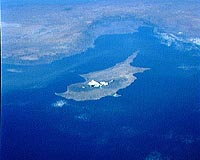| . |  |
. |
San Salvador (AFP) July 14, 2009 Football is known to millions as the "beautiful game," but this week El Salvador and Honduras remember a not-so-pretty episode in the sport's history 40 years ago that spurred the two nations into war. In July 1969 tensions between the two Central American nations spilled over during bad-tempered World Cup qualifying matches, which led to El Salvador scrambling its air force and bombing its neighbor. The war displaced an estimated 300,000 Salvadorans who were living in Honduras and killed thousands in both countries. The El Salvadoran army is planning a week of events to mark the events, made famous by Polish journalist Ryszard Kapuscinski in his book the "The Soccer War." The army said it would pay homage to "those that gave their lives in the defense of the nation." While football helped trigger the war, its real driver was resentment over large-scale migration from El Salvador to Honduras. The violence was sparked by a Honduran land reform law that pushed hundreds of thousands Salvadorans from their homes in Honduras. Amid outrage over the discrimination and images of impoverished Salvadoran families fleeing with their meager belongings in tow, the two countries met to see who would play in the 1970 World Cup, which was held in Mexico. Tiny and crowded, El Salvador has long had the highest population density in Central America. Honduran ire was fueled by perceived unequal treatment in the common market of Central America. Hostilities began on the July 14, when then Salvadoran president Fidel Sanchez Hernandez, who died in 2003, ordered his largely-makeshift air force to bomb Tegucigalpa's main Tocotin airport. The airport was again the center of world attention earlier this month as protesters awaited President Manuel Zelaya's attempt to return home a week after he was bundled out of the country in a coup. In 1969, Salvadoran troops also entered the country by land, at one point occupying a tranche of southern Honduras that extended 150 kilometers (90 miles) from the border. Honduras responded by ordering the bombing of the capital San Salvador and strategically vital energy facilities. It eventually fought the Salvadoran forces to a stalemate. But not before an estimated 5,000 people were killed or hurt in the four-day war, which ended when the Washington-based Organization of American States brokered a ceasefire. Diplomatic relations between El Salvador and Honduras were not normalized until 1980, when a peace treaty was signed in Lima, Peru. El Salvador eventually qualified for the World Cup, but came bottom of their group, getting walloped by the USSR, Mexico and Belgium. Share This Article With Planet Earth
Related Links
 Greek Cypriots say reunification deal unlikely in 2009
Greek Cypriots say reunification deal unlikely in 2009Nicosia (AFP) July 14, 2009 The Cyprus government said on Tuesday that a reunification deal to end decades of division on the island is not on the cards in 2009, as hoped for by the international community. "As things stand now, with the positions tabled by the Turkish side, and nothing changes, we don't see how it's possible for a settlement to be agreed on and put to a referendum by December," government spokesman St ... read more |
|
| The content herein, unless otherwise known to be public domain, are Copyright 1995-2009 - SpaceDaily. AFP and UPI Wire Stories are copyright Agence France-Presse and United Press International. ESA Portal Reports are copyright European Space Agency. All NASA sourced material is public domain. Additional copyrights may apply in whole or part to other bona fide parties. Advertising does not imply endorsement,agreement or approval of any opinions, statements or information provided by SpaceDaily on any Web page published or hosted by SpaceDaily. Privacy Statement |